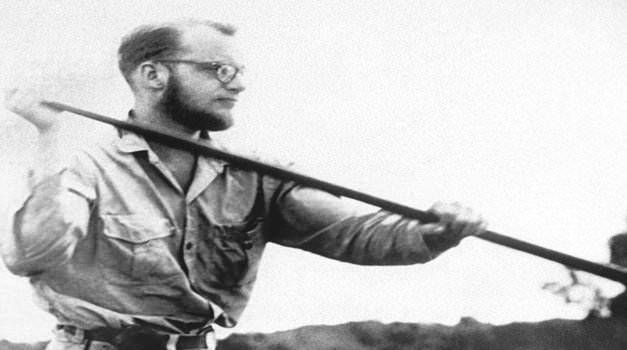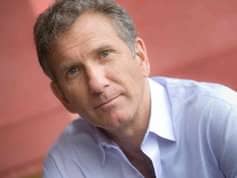Savage Harvest by Carl Hoffman
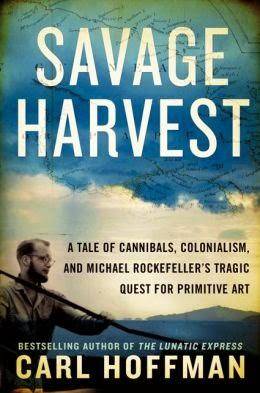 In 1961, Michael Rockefeller, the 23-year-old son of one of the richest and most powerful men in America, vanished off the coast of New Guinea. In his thrilling new book Savage Harvest (Morrow, March), veteran journalist Carl Hoffman (The Lunatic Express) retraces Rockefeller’s steps and comes to startling conclusions about the ultimate fate of Nelson Rockefeller’s son. Before his reading at Portland, Oregon’s Powell’s Books, Hoffman sat down with BookTrib to discuss the book and the journey it took to write it. Publishers Weekly calls Savage Harvest “an expertly told tale that is begging for a film adaptation,” while Kirkus says Hoffman’s “searching, discomfiting journey yields an elegant, memorable report.”
In 1961, Michael Rockefeller, the 23-year-old son of one of the richest and most powerful men in America, vanished off the coast of New Guinea. In his thrilling new book Savage Harvest (Morrow, March), veteran journalist Carl Hoffman (The Lunatic Express) retraces Rockefeller’s steps and comes to startling conclusions about the ultimate fate of Nelson Rockefeller’s son. Before his reading at Portland, Oregon’s Powell’s Books, Hoffman sat down with BookTrib to discuss the book and the journey it took to write it. Publishers Weekly calls Savage Harvest “an expertly told tale that is begging for a film adaptation,” while Kirkus says Hoffman’s “searching, discomfiting journey yields an elegant, memorable report.”
Did you start the project thinking that you’d ultimately solve the mystery of Michael Rockefeller’s disappearance?
No, actually. When I was in my original meeting with William Morrow, I said to them, “if you’re only going to buy this book because you expect me to solve what happened to Michael, you can’t do that, that’s a mistake because I don’t know that I can.” I didn’t think that I could. I’d originally pitched a slightly different book. It was still about Michael Rockefeller and it was following in his footsteps, but I really wasn’t sure I was going to find anything. In a certain way, I couldn’t imagine that I did. That said, I wasn’t pitching totally blindly. I’d looked at all the information and to me, there were holes. Everyone mentioned this Dutch government raid, but there was no information about it. No names, no dates, nothing. I thought, well, if this really happened, there have to be government reports about this. I just couldn’t believe there weren’t more official papers.
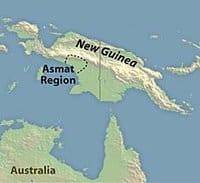 It seems like in the end you found these official papers.
It seems like in the end you found these official papers.
Yes, I found hundreds of pages of documents. And the story ended up being a hundred times richer than I ever imagined. I had inklings of that but it was beyond my wildest dreams in a lot of ways. I hired this researcher in Amsterdam and the stuff we started finding was just amazing. And then we found the two Dutchmen, that was really good. And in the end, that’s what I did that nobody else really had done: find all these documents. Part of that was luck because I think 20 or 30 years earlier, the documents weren’t available—they were probably tucked away in hidey-holes. And yet they were all public documents. We didn’t do anything special to find them. We didn’t pay anyone off or crawl in any tunnels: they were just there but nobody had really looked. So it wasn’t just 50-year-old stories, 50-year-old memories that old men were telling. They would tell me these stories and then I would find the documents that they were talking about. They were incredibly validating, they corroborated everything the men said. I didn’t find anything that didn’t. And because I had those, I was prepared when I went to Asmat. If you ask the Asmat about Michael Rockefeller, they’d say, “who’s Michael Rockefeller?” And you describe him and they’d say anything. Maybe they remember him, maybe they don’t. But if you ask, “was there a raid by a Dutch government official?” they remember very specifically and they remember that these certain men were killed. You go back into the 50-year-old documents and find these same names. So it makes it something tangible, it’s not memory. Especially in Asmat, there’s no writing, no records or anything. But they have their stories. And you start looking for anything that’s wildly out there and you set that aside. That’s the way it went, over and over again, these two pillars: the stories and the documents. It’s not me taking leaps.
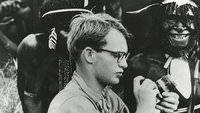 Do you think Michael Rockefeller went into the situation with the assumption that he’d automatically be granted access to everything because he was a Rockefeller?
Do you think Michael Rockefeller went into the situation with the assumption that he’d automatically be granted access to everything because he was a Rockefeller?
I don’t know if he said “I’m a Rockefeller therefore I deserve access!” I think he made a mistake that we all make: that we can go into a place and people will open up and welcome us into their homes and grant us their deepest secrets. And let us give you our sacred art, too. I think I made the same mistake he made, at first.
Rockefeller was also so young when he was killed.
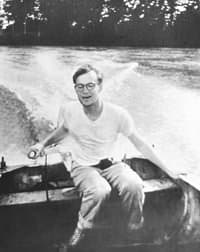 So young. 23 years old, from one of the richest, most powerful families in the world. And by all accounts, he was an earnest, well-meaning guy. It’s not like he was some playboy and running around in Asmat saying, “gimme, gimme, gimme!” He was schooled in art and aesthetics by the family and had grown up around some of the greatest art ever produced. I think he just wanted to know more. With his money, he had the ability to do it fast and as I say, he had the Western sort of arrogance that I had, too. And then you add to the fact that he was only 23. It ended up being a lethal combination. It was a matter of luck, or rather the opposite of luck. Had he arrived on that beach in another circumstance, as he had before, or had he been with someone else, I don’t think anything would have happened to him. I think it was because he was alone and vulnerable and exhausted. And the men just acted like Asmat in that situation.
So young. 23 years old, from one of the richest, most powerful families in the world. And by all accounts, he was an earnest, well-meaning guy. It’s not like he was some playboy and running around in Asmat saying, “gimme, gimme, gimme!” He was schooled in art and aesthetics by the family and had grown up around some of the greatest art ever produced. I think he just wanted to know more. With his money, he had the ability to do it fast and as I say, he had the Western sort of arrogance that I had, too. And then you add to the fact that he was only 23. It ended up being a lethal combination. It was a matter of luck, or rather the opposite of luck. Had he arrived on that beach in another circumstance, as he had before, or had he been with someone else, I don’t think anything would have happened to him. I think it was because he was alone and vulnerable and exhausted. And the men just acted like Asmat in that situation.
And what’s ironic, at least in Western thinking, is that he wasn’t killed because he was rich and famous and a Rockefeller.
No, the Asmat didn’t know. They couldn’t care less.
The Rockefellers are still so much a part of our cultural consciousness. Why do you think that’s the case?
The Rockefellers played an enormous role in the cultural landscape of America. Abby Aldrich Rockefeller—Nelson’s mother and Michael’s grandmother—opened the Museum of Modern Art in 1929, which is a marquee cultural institution. And the Metropolitan Museum of Art owes a huge debt to the Rockefellers. The collection from the Museum of Primitive Art, which Nelson opened, all moved into the Met. And if you look at the Rockefeller Foundation, its beneficiaries go on for dozens of pages. Nearly every cultural institution in America has benefitted from Rockefeller largesse.
To learn more about Michael Rockefeller’s disappearance—we won’t spoil it for you here—check out Savage Harvest.
Image Credits:
Michael Rockefeller cover image: http://www.npr.org/2014/03/18/291140637/cannibals-and-colonialism-solving-the-mystery-of-michael-rockefeller
Michael Rockefeller, boat: http://www.nydailynews.com/entertainment/music-arts/michael-rockefeller-killed-eaten-headhunters-claim-article-1.1722883
Michael Rockefeller with Asmat: http://fineartamerica.com/featured/michael-c-rockefeller-1934-1961-everett.html
Asmat map: http://www.metmuseum.org/toah/hd/asma/hd_asma.htm
Carl Hoffman author photo: http://www.npr.org/2014/03/18/291140637/cannibals-and-colonialism-solving-the-mystery-of-michael-rockefeller
Buy this Book!
Amazon

